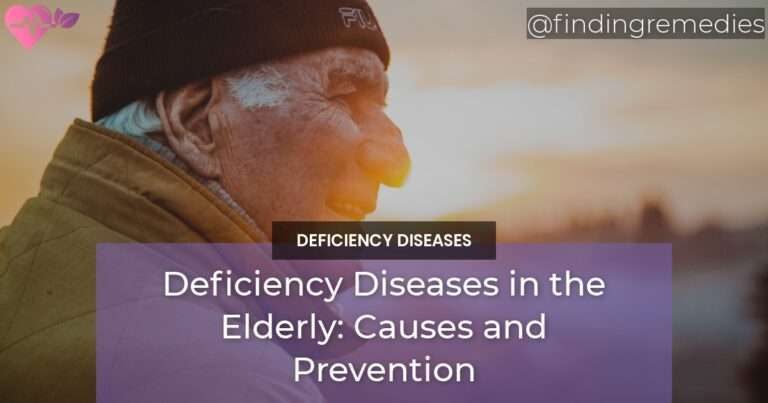Deficiency diseases are caused by inadequate intake of essential nutrients needed by the body for optimal functioning.
These deficiency diseases among the elderly are much more prevalent, which makes nutrition a critical factor in promoting their health and well-being.
In this article, we will define deficiency diseases, and their importance in the elderly, and outline the causes and prevention of these diseases.
Table of Contents
Types of Deficiency Diseases in the Elderly
Deficiency diseases can be classified into two categories: vitamin deficiencies and mineral deficiencies. Vitamin deficiencies are caused by inadequate intake or absorption of vitamins, while mineral deficiencies are caused by a lack of minerals in the diet.
Vitamin Deficiencies
Vitamins are essential organic compounds that the body needs to support various body functions. Vitamin deficiencies are prevalent among the elderly due to reduced nutrient absorption, medication interactions, and chronic illnesses. Common vitamin deficiencies in the elderly include vitamin D, vitamin B12, and folate deficiency.
Symptoms
Symptoms of vitamin deficiencies include fatigue, muscle weakness, cognitive decline, anemia, and depression.
Prevention
To prevent vitamin deficiencies, the elderly should consume a healthy diet rich in fruits, vegetables, and whole grains. Vitamin supplements are also recommended to meet their daily requirements.
Mineral Deficiencies
Minerals are essential inorganic compounds needed by the body to support various physiological functions. Mineral deficiencies are prevalent among the elderly due to reduced intake, malabsorption, and chronic illnesses. Common mineral deficiencies in the elderly include calcium, magnesium, and zinc deficiencies.
Symptoms
Symptoms of mineral deficiencies include muscle cramps, fatigue, weak bones, and cognitive impairment.
Prevention
To prevent mineral deficiencies, the elderly should consume a healthy diet rich in fruits, vegetables, and fortified foods. Mineral supplements are also recommended to meet their daily requirements.
Causes of Deficiency Diseases in the Elderly
Poor Diet
Poor diet is a leading cause of deficiency diseases in the elderly. As people age, their nutrient requirements change, and they may not consume enough nutrient-rich foods. This can lead to malnutrition and other health problems.
Examples of poor diet in the elderly include skipping meals, consuming high-fat or high-sugar foods, and not eating enough fruits and vegetables. Eating a healthy and balanced diet is crucial to prevent deficiency diseases.
Malabsorption Syndrome
Malabsorption syndrome is a condition where the body cannot absorb essential nutrients from the diet. This can lead to deficiency diseases, even if the individual consumes enough nutrient-rich foods.
Symptoms of malabsorption syndrome include diarrhea, abdominal pain, and weight loss. Treatment of malabsorption syndrome involves identifying the underlying cause, such as celiac disease, and treating it accordingly.
Medications
Certain medications can interfere with nutrient absorption, leading to deficiency diseases. These medications include diuretics, acid suppressants, and cholesterol-lowering drugs.
Monitoring medication and nutrient interactions is crucial to prevent deficiency diseases. In some cases, the individual may need to adjust their medication or take supplements to meet their nutrient requirements.
Reduced Sunlight Exposure
Reduced sunlight exposure is a common cause of vitamin D deficiency in the elderly. Vitamin D is essential for bone health and immune function. The elderly are at a higher risk of vitamin D deficiency due to reduced sunlight exposure and reduced nutrient absorption.
To prevent vitamin D deficiency, the elderly should spend time in the sun, consume vitamin D-fortified foods, or take vitamin D supplements.
Prevention of Deficiency Diseases in the Elderly
Regular Check-ups
Regular check-ups are crucial for the early detection and treatment of deficiency diseases. Routine blood tests can determine if an individual has a deficiency and identify the underlying causes.
Balanced Diet
A balanced diet is essential to prevent deficiency diseases in the elderly. Nutrient-rich foods such as fruits, vegetables, lean protein, and whole grains should be included in their diet.
Meal planning tips for the elderly include consuming smaller meals throughout the day, incorporating more fiber, and reducing sodium intake.
Exercise and Physical Activity
Exercise is essential to maintain overall health and prevent deficiency diseases. Regular physical activity can improve mobility, cognitive function, and mood.
Recommended exercise for the elderly includes walking, swimming, and yoga. Precautions and safety tips should be taken to prevent injuries.
Supplements
Supplements may be necessary for the elderly to meet their daily nutrient requirements. However, not all supplements are safe, and they may interact with medication.
Types of supplements for the elderly include multivitamins, calcium supplements, and omega-3 supplements. It is recommended to consult a healthcare provider before taking any supplements.
In conclusion, Deficiency diseases are prevalent among the elderly and can lead to a decline in their quality of life. By understanding the causes and prevention of these diseases, we can promote optimal health and well-being in the elderly. A balanced diet, regular exercise, and supplements can help prevent deficiency diseases and support healthy aging. Regular check-ups and early detection of deficiency diseases are crucial in preventing complications and improving overall health.

